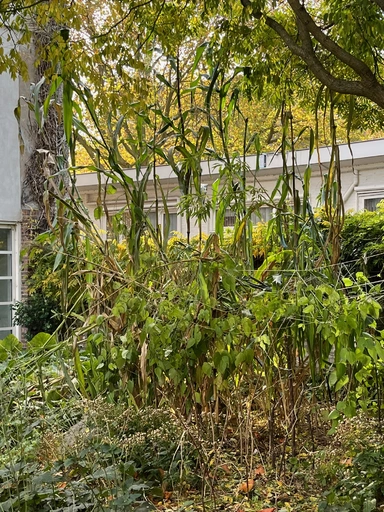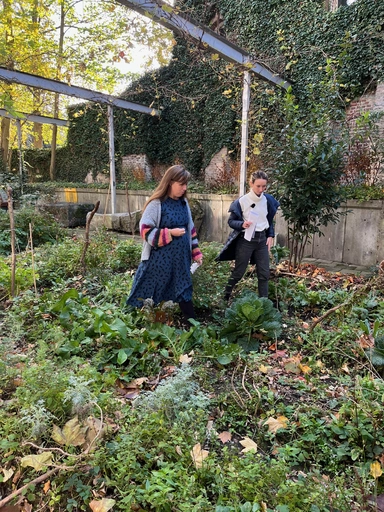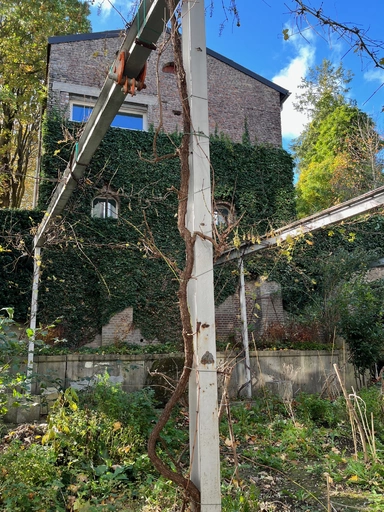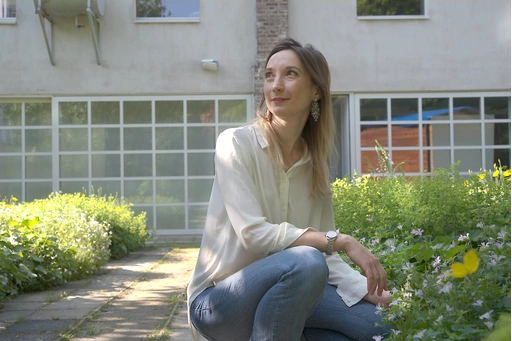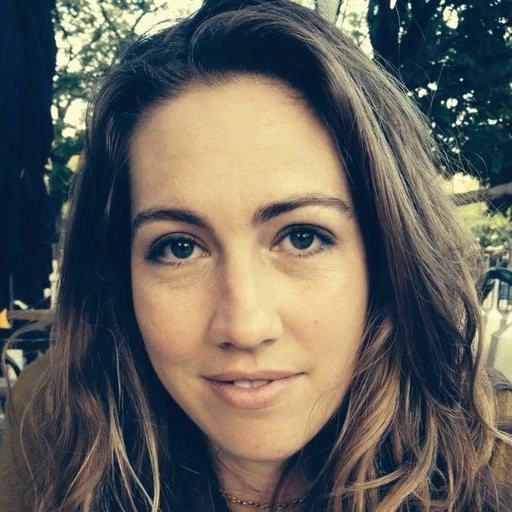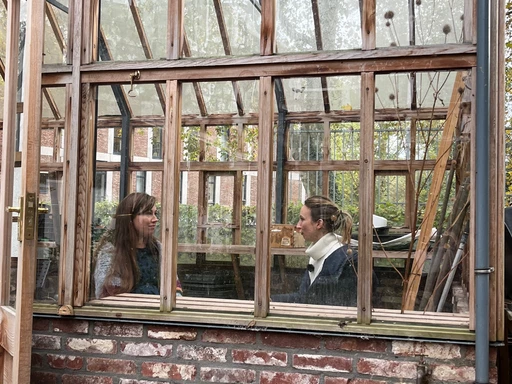
In full bloom
a conversation between Angela Jerardi and Giulia Bellinetti in the gardens of Jan van Eyck Academy
podcasttopic: Future Art School
What does it mean to make a garden a site for ecological practice, pedagogy and labor within the context of an art institution? What experiences, aesthetics and frictions emerge through gardening?
What does it mean to make a garden a site for ecological practice, pedagogy and labor within the context of an art institution? What experiences, aesthetics and frictions emerge through gardening?
This episode takes us to the gardens of the artist residency of the Jan van Eyck Academy in Maastricht, where our guest, teacher, researcher, and writer Angela Jerardi is invited to be in conversation with the head of the Nature Research department and coordinator of Future Materials of the Jan van Eyck Academy, and PhD researcher at ASCA, Giulia Bellinetti.
This episode takes us to the gardens of the artist residency of the Jan van Eyck Academy in Maastricht, where our guest, teacher, researcher, and writer Angela Jerardi is invited to be in conversation with the head of the Nature Research department and coordinator of Future Materials of the Jan van Eyck Academy, and PhD researcher at ASCA, Giulia Bellinetti.
In a courtyard where branches overgrow steel structures, and ivy foliage softens their voices, and dampens their footsteps, Angela and Giulia speak on how they have moved their teaching, research and writing into gardens and land practices. Walking between pumpkins, bamboo, and compost, they reflect on the questions, labor and hardships that have maintained their care work. How is seasonal time or lived time affected by the demands of institutional time? How can we attune ourselves to the pace and divergence of lived time of species? Speaking on strategies that art institutions employ to bring forth topics of ecology, land and climate, they reflect on how concepts and verbs can become increasingly metaphorical and rhetorical in art discourses. Walking in fall leading into winter, they move towards the edges of the garden where transformative questions have taken root, for you to anticipate their full bloom.
Take a breath and tune into the warm autumn breeze and whispering leaves on their walk in these gardens.
Take a breath and tune into the warm autumn breeze and whispering leaves on their walk in these gardens.
This episode is in two parts.
In the first part, departing from the soil, Angela and Giulia unpack how a garden affects and takes shape in each of their practices, and what this means in the context of an art institution.
After the break, they take us into the glass house of the garden where their conversation spans strategies that artists, communities and art institutions employ, and the relationships that emerge through them.
Part One (00:00 – 37:00) and Part Two (37:57 – 1:33:12).
In the first part, departing from the soil, Angela and Giulia unpack how a garden affects and takes shape in each of their practices, and what this means in the context of an art institution.
After the break, they take us into the glass house of the garden where their conversation spans strategies that artists, communities and art institutions employ, and the relationships that emerge through them.
Part One (00:00 – 37:00) and Part Two (37:57 – 1:33:12).
Show notes
Other references that have been very influential to Giulia’s thinking and work on temporalities are:
Maria Puig de la Bellacasa, Matters of Care (2017)
Lumbung and documenta fifteen documenta-fifteen.de/en/lumbung/
La Intermundial Holobiente claudiafontes.com/project/the-book-of-the-ten-thousand-things/
Pierre Huyghe, Untilled www.on-curating.org/issue-33-reader/thinking-the-arrival-pierre-huyghes-untilled-and-the-ontology-of-the-exhibition.html
George Monbiot, Regenesis (2022)
Maria Puig de la Bellacasa, Matters of Care (2017)
Lumbung and documenta fifteen documenta-fifteen.de/en/lumbung/
La Intermundial Holobiente claudiafontes.com/project/the-book-of-the-ten-thousand-things/
Pierre Huyghe, Untilled www.on-curating.org/issue-33-reader/thinking-the-arrival-pierre-huyghes-untilled-and-the-ontology-of-the-exhibition.html
George Monbiot, Regenesis (2022)
About
Angela Jerardi is a curator and writer who mostly lives in Amsterdam. Her activities amalgamate around a constellation of interests including: divergent ways of knowing, collective models of working, and the exploration of play and humor as a pedagogical and exhibition-making methodology. Her research focuses on a knot of cultural phenomena, including: utopian thinking, sanitation, absurd tools, speculative futures and socioeconomic botany. She completed the de Appel Curatorial Programme in 2013, and has an academic background in cultural anthropology.
Motivated by an interest in the collective resource of plant-based sustenance and the nascent field of plant neurobiology, her current research intertwines the human regulatory perspective of international legislation of food security and plant resources and the study of plant intelligence as it relates to the uniqueness of plants’ “sessile life style,” living literally rooted in place. Central to this study are pieces of proposed and active legislation regarding plant genetic resources, and the restriction of their movement and exchange. Despite their lack of legibility, these legislative documents have potentially far reaching impact on the availability of plant-based food in the future. An oft-quoted statistic estimates that there are over 20,000 species of edible plants in the world yet fewer than 20 species currently provide 90% of our food. Thus wild-sourced foods and seed saving and exchanging will become increasingly important in the years to come. Meanwhile the recent development of the human study of plant intelligence has developed new thinking on plant interspecies cooperation and communication, such as in subterranean forest networks and in their sophisticated use of biochemistry. This research can then perhaps offer a reflective critique to the perceived singularity of our species, and more broadly of animalian forms of life.
Giulia Bellinetti is the coordinator of the Nature Research department and runner of the Future Materials Lab at the Jan van Eyck Academy. Previously, she was Coordinator of the Production Department at the M HKA, the Museum of Contemporary Art of Antwerp. In recent years, Giulia has become increasingly interested in the ecological discourse in relation to contemporary art, institutional work and interdisciplinary forms of collaborations. She is currently conducting a PhD research project on the epistemic function of art institutions in the age of ecological crisis at the Amsterdam School of Cultural Analysis (University of Amsterdam).
Motivated by an interest in the collective resource of plant-based sustenance and the nascent field of plant neurobiology, her current research intertwines the human regulatory perspective of international legislation of food security and plant resources and the study of plant intelligence as it relates to the uniqueness of plants’ “sessile life style,” living literally rooted in place. Central to this study are pieces of proposed and active legislation regarding plant genetic resources, and the restriction of their movement and exchange. Despite their lack of legibility, these legislative documents have potentially far reaching impact on the availability of plant-based food in the future. An oft-quoted statistic estimates that there are over 20,000 species of edible plants in the world yet fewer than 20 species currently provide 90% of our food. Thus wild-sourced foods and seed saving and exchanging will become increasingly important in the years to come. Meanwhile the recent development of the human study of plant intelligence has developed new thinking on plant interspecies cooperation and communication, such as in subterranean forest networks and in their sophisticated use of biochemistry. This research can then perhaps offer a reflective critique to the perceived singularity of our species, and more broadly of animalian forms of life.
Giulia Bellinetti is the coordinator of the Nature Research department and runner of the Future Materials Lab at the Jan van Eyck Academy. Previously, she was Coordinator of the Production Department at the M HKA, the Museum of Contemporary Art of Antwerp. In recent years, Giulia has become increasingly interested in the ecological discourse in relation to contemporary art, institutional work and interdisciplinary forms of collaborations. She is currently conducting a PhD research project on the epistemic function of art institutions in the age of ecological crisis at the Amsterdam School of Cultural Analysis (University of Amsterdam).
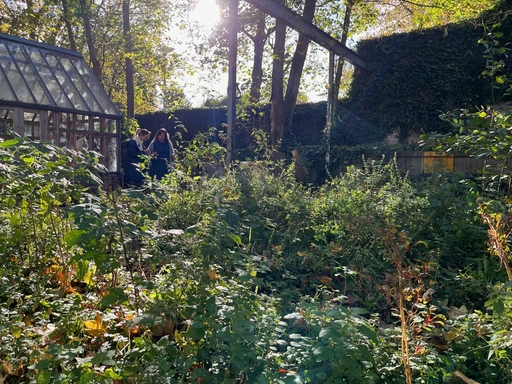

related content
people – 22 apr. 2024
Giulia Bellinetti
refered to from:
people – 22 apr. 2024
